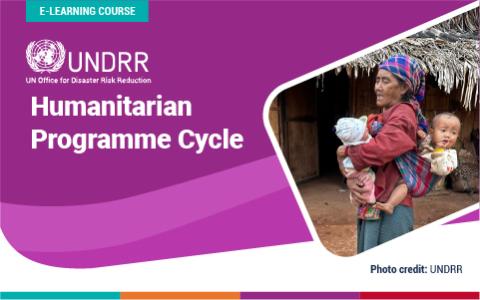
Humanitarian Programme Cycle
In 2024, nearly 300 million people around the world will need humanitarian assistance and protection, due to conflicts, climate emergencies and other drivers.
To prevent individuals at risk from becoming people in need, there are specific recommendations for integrating Disaster Risk Reduction (DRR) and Risk Analysis into humanitarian response. The Humanitarian Programme Cycle (HPC) refers to a series of actions undertaken in the management of
international humanitarian response operations. Actions in the HPC must be conducted in collaboration with and in support of national and local authorities.
This course provides specific recommendations on how to integrate risk analysis during the HPC, particularly in the elaboration of Humanitarian Needs Overview (HNO). The HNO is a document produced by humanitarian organizations to assess and analyze the needs of populations affected by crises, disasters, or conflicts in a particular region or country. The HNO typically provides an overview of the humanitarian situation, including the scope and scale of needs, vulnerable populations, and priority areas for intervention. It serves as a foundational document for the humanitarian response, helping to guide the planning and coordination of assistance efforts by humanitarian actors, governments, and other stakeholders.
The e-learning course “Humanitarian Programme Cycle” integrates a risk-informed approach to consolidate, collect and analyze data for risk analysis to support humanitarian action. It also suggests a simple tool to help organize the collected data and analysis (Risk Analysis Matrix).
This e-learning course aims to strengthen the capacities of participants on the application of a forward-looking and evidence-based analysis in the development of Humanitarian Needs Overviews and Humanitarian Needs Response Plans.
At the end of the course, participants will be able to:
1. Explain the importance of the use of a risk-sensitive approach in the formulation of Humanitarian Needs Overview (HNO).
2. Outline the key stages of the Humanitarian Programme Cycle (HPC) and several options for integrating
a risk lens and/or DRR actions in each.
3. Develop a multidimensional risk analysis for discussions and validation in a workshop setting.
4. Plan and prepare a risk analysis workshop for HNOs
5. Summarize findings and write up drafts of the HNOs risk chapters.
The course is comprised of the following modules:
Module 1. Risk Analysis for Humanitarian Planning.
Module 2. Risk Informed Humanitarian Programme Cycles.
Module 3. Step-by-step Approach for Risk Analysis and Informing Strategic Planning.
Module 4. Practical Resources for and Examples of Successful Risk Analysis Workshops.
This is a self-paced, interactive course. The course contains the following components:
Interactive lessons. They introduce you to the conceptual foundations of the different modules in an interactive manner.
Templates and samples. They complement the interactive lessons and provide relevant information to conduct risk analysis workshops:
- Introductory slide decks for initial engagement
- Half day agenda for risk analysis workshop
- Full day agenda for risk analysis workshop
- Risk analysis matrices (EN, SP, FR)
- Example of Checklist session slide deck
- Draft risk chapters
- RiX Spotlights (Editable versions)
- Participant’s workshop folder
This course is targeted toward professionals on risk analysis who seek to understand the application of a forward-looking and evidence-based analysis in the development of Humanitarian Needs Overviews and Humanitarian Needs Response Plans.

